- Home
- Annelie Wendeberg
The Devil's Grin - a Crime Novel Featuring Anna Kronberg and Sherlock Holmes Page 3
The Devil's Grin - a Crime Novel Featuring Anna Kronberg and Sherlock Holmes Read online
Page 3
‘The punctures look professionally done, not like the holes they punch into people in opium dens. He must have seen a medical doctor. Very unusual,’ I observed while picking up my largest knife.
I was not sure about Mr Holmes’s endurance when it came to slicing apart human beings, so I kept half an eye on him while cutting a large letter Y starting at the man’s collar bones and extending down to the pubic bone. Mr Holmes, though, seemed perfectly unmoved by my doings, so I proceed with sawing off the breast bone and part of the ribcage. The odour worsened significantly then. I never got used to the stench of death.
I dissected the lungs, and the pressure exerted on them resulted in the expulsion of pink froth from the corpse’s nose and mouth. My physique was not ideal for a dissection, or rather - I did not have the figure of a butcher. Grunting, I worked the lungs out and into a bowl.
‘As I suspected - the man didn’t drown,’ remarked Mr Holmes upon the fact that the lungs were not filled with water.
‘They contain only a small amount of dust and soot, supporting your assumption the man spent most of his life in the countryside,’ I added. Had he been a Londoner, his lungs would have appeared grey.
The number and size of the coagula inside the man’s abdomen corroborated our assessment of the time of death.
That he had had cholera in the final stage was clear as bright daylight. Additional to the appearance of his skin, his liver was reduced and pale and the gastrointestinal tract empty. Only a small amount of dirty greenish liquid was left.
All organs went into separate bowls, leaving me panting and sweating. By now the apron had taken the function of a sauna and my hands felt like slippery fish inside the gloves.
Mr Holmes bent down low over the corpse, while staring straight into the man's now half emptied abdomen. Obviously, dissections were a great entertainment for him.
I examined the man’s mouth and eyes and saw that his tongue was swollen and impressions of his teeth showed along its edges. I pushed the remains of his eyelids apart and after a moment’s consideration turned to Mr Holmes. ‘What do you make of this?’
He gazed into the milky blue eyes with one pupil as small as a pin prick, the other spanning almost the entire iris.
‘Poison, or possibly a head trauma?’ he wondered aloud.
‘Hmm…’ I answered and examined the man’s skull again, but still could not find any signs of violence.
I took up a smaller knife and made a cut along the hairline, and one from there to the top of his head and down on the back again. Then I pulled the skin to the side of the head and over his face. My hands worked with precision, but my brain revolted. Skinning a human face is another thing I would never get used to.
I got a saw and opened the skull. Great skill was needed to cut only the bones and leave the nerve tissue untarnished.
The brain appeared normal. I extracted the right hemisphere and cut it into slices. Then I took the magnifying glass from Mr Holmes's hand and bent down over the brain sections. Small liquid filled lesions presented themselves.
‘Odd!’ I straightened up and tossed my tools aside. His magnifying glass produced a loud clonk on the slab.
As I leaned with both hands on the marble slab my brain emptied and my eyes flew over the corpse. I wondered what I had missed. After a while I stripped off my gloves and pressed my fingers into the bend of the elbow. The punctures felt a little stiffer than the surrounding tissue. I cut through them and pulled the skin apart. The vein appeared slightly infected.
‘It seems as if the man had had a needle inserted and then left there for a longer time,’ I told Mr Holmes, intrigued.
‘That would make restraints necessary,’ he concluded.
The man’s stomach lay in a bowl next to me. I open the organ and another surprise presented itself: half digested bread and smoked fish, probably eel, swam merrily out of the opening.
‘The man had eaten, although he shouldn’t have had an appetite at all during the final stage of cholera. And yet, he ate a substantial amount! I can see no signs of force feeding in his mouth or oesophagus. Peculiarly, his stomach had cramped shut for probably two or three hours before his death. Although half digested, none of the food made it into the small intestines. Why is that?’ My fingers hammered onto the slab; then I ripped my mask off and my apron, and disinfected myself. ‘Wait here,’ I said before leaving with haste.
Mr Holmes had his eyebrows pulled up as I returned with a box of polished birch wood. I set it on one of the other slabs and extracted a stereomicroscope from it. I wiped its three lenses and both oculars with a silken handkerchief.
‘May I introduce the best microscope you will ever set your eyes upon. Or rather, peer through,’ I said enthusiastically. ‘I found this one in Boston, although it’s a German make. Its secret lies in the stacks of multiple lenses. I never came across a better one. And it had cost me an arm and a leg,’ I explained while extracting liquid from the man’s vein.
I placed a single drop of serum onto a glass slide; tipped a cover slip as thin as a piece of paper onto the drop to flatten it to a thin film of liquid. Then, I fastened the slide onto the holder just underneath the largest microscope lens and inserted a drop of immersion oil underneath. I aligned the small mirror at the bottom of the microscope towards the sun, peered through the oculars, and focussed on the swirling particles.
‘What resolution does it have?’ asked Mr Holmes.
‘With an approximately one-thousand-fold magnification I can see anything as small as two micrometers.’
‘Exceptional!’ he cried out, and I had to smile at the small cells, which had the resemblance of miniscule tennis rackets - ones that were five micrometers long, swam fast, and could kill every warm-blooded vertebrate. I beckoned to him to take a look.
‘Germs!’ he said, intrigued.
‘Yes. It seems you were right, Mr Holmes.’
‘I never mentioned that possibility!’ he protested.
‘Unknowingly, you did. You mentioned poison.’ Upon his quizzical look I added: ‘Germs produce toxins. That’s how they kill.’
‘But cholera is not-‘
‘No,’ I interrupted, ‘he didn’t die of cholera. Although he had it in its final stage, I believe he was already recovering. The food in his stomach indicates that. The deadly blow must have come from tetanus. But I don’t know how he got infected. The needle punctures are only slightly inflamed, and don’t show the typical appearance of a tetanus entry wound.’
Mr Holmes was standing next to me mulling things over silently. I was almost done cleaning up my dissection equipment when he muttered: ‘I need to take that bowl with me,’ indicating the collection of twigs, leaves, and beetles I had picked from the man.
‘How good are you at identifying them?’
‘I dare say the best.’
I could have guessed that much.
He pulled off his gloves, apron, and mask and I showed him how to disinfect himself and the contents of the bowl he wanted to take with him.
‘I suggest we meet Inspector Gibson at my residence tomorrow morning at eight.’
‘Hm...’ I replied.
‘Would that be a problem?’
‘I’ll think about it. I may go to the main quarters directly.’ I avoided looking at him. He turned to leave but then seemed to think otherwise. ‘I assume you wouldn’t tell me your real name?’
Aghast, I shook my head. ‘Don’t try to find it out behind my back, please.’
He looked slightly amused then.
‘Do you want me to find out your address behind your back? Just in case, I mean.’
He slapped his hand against the door frame, ‘221B Baker Street.’
Chapter Three
I stepped off the omnibus and just managed to avoid a pile of horse manure on the pavement. Turning around, I spotted the street sweeper. He was leaning onto his broom handle, chewing on something obviously ropy, which he repeatedly picked from the gaps of missing teeth to suck the f
indings of his archaeological excavation off his fingers. There were a few things that did excel dissections in being unappetising.
I tipped my hat at him, entered the eastern end of Regents Park, and turned north. The bustling of the street behind me gradually dimmed to be replaced by the quiet chatter of couples walking arm in arm and sparrows’ grating chirps.
After a few minutes I reached 221B Baker Street. As its neighbours, the three story house was built of red bricks with its base looking as if it had been dipped into cream. It had large white-framed windows and a smoked oak door. As my hand closed around the cold brass knocker I wondered how much Holmes earned with that odd occupation of his. After a knock and a short moment of waiting, the stout landlady beckoned me in.
I watched my feet climb the stairs while thoughts swirled around in my head like a swarm of mosquitoes. To me, Holmes was a magnet with North and South Pole unified. He knew my secret and could, with a single statement, destroy my life. I did not know whether avoiding him or observing him would be the safer tactic.
Upon reaching the landing I finally lifted my gaze and noticed a small crater in the wall. I probed with my finger, which disappeared entirely. Amazed to have found a bullet hole, I extracted my finger again, brushed the plaster off, and knocked at Holmes’s door.
Gibson opened, I stepped in, and the world changed from polished and gleaming to utter chaos. The ceiling was decorated with stains exhibiting a spray pattern indicative of an explosion. Some spots looked as if acid had eaten into the plaster. I had noticed splotches on Holmes’s hands yesterday but wasn’t able to identify them. Now I knew - the man was a hobby scientist.
Enormous stacks of paper hid the desk, a chair, and most of the mantle piece, where a knife stuck in the nicely carved wood holding a bunch of papers. On top of the marred thing I noticed the photograph of a beautiful woman.
I apologised for being late. Gibson was pacing the sitting room, looking important. Holmes himself was smoking a pipe in an armchair by the fireplace, looking bored. His violin lay on the coffee table as if he had recently played it.
A small and very timid chamber maid with hair the colour of dirty egg yolk served us tea and biscuits. She did not glance at anyone in the room. Slinking here and there, she seemed to go unnoticed by Gibson, who now lowered himself into the other armchair to receive his refreshments.
Holmes was giving Gibson the results of the dissection, but did not elaborate on the twigs and beetles, nor on any other thoughts he entertained on the case.
‘Were you able to identify the man, Inspector?’ I enquired.
He shook his head, showing me his annoyance. ‘No, I already told Mr Holmes I’m afraid it will be entirely impossible. He didn’t have any papers on him and no one who fits his description had been reported missing. I will not waste my time investigating this case. I hope you agree, Mr Holmes.’
Holmes nodded without looking up and Gibson heaved himself off the chair with a satisfied smile.
‘Dr Kronberg, if I have any other questions I will contact you,’ said Gibson and took his leave. I knew he wouldn't and that was just as well.
As the Inspector trampled down the stairs, I stood with my back to the closed door and looked at Holmes. ‘Interesting,’ I noted and he opened his eyes, apparently surprised to see me.
‘Is there anything else, Dr Kronberg?’ His voice was monotonous.
‘Gibson is wrong and you know it.’
Holmes raised one eyebrow and I waved my hand at him, saying: ‘Well, when is he not?’
‘Indeed,’ murmured Holmes with an expression of impatience.
‘My apologies for wasting your time Mr Holmes,’ I produced a warm smile. ‘I only have two questions. Did I miss anything of importance due to my late arrival?’ He shook his head in reply. ‘The second question is: could you find anything of interest in the bowl you took home yesterday?’
‘It was full with insects, leaves, and dirt. Highly interesting,’ he yawned.
His gaze followed mine as I looked at the violin and said: ‘She is on top of the bread crumbs - you played her before Gibson came in. Are you on a case at present?’
He narrowed his eyes and I saw him getting ready for combat.
‘What amused you about the maid?’ he asked calmly.
I smiled, he wanted a diversion. So be it. ‘I was wondering why she was so extremely shy. Whether it could be her inexperience or a problem she has with you. The fact that I wondered at all, was, well… amusing.’
‘Amusing?’ he asked.
‘Mr Holmes, you are the most observant man I ever came across, yet you want me to believe that you don't know the impression you leave on others?’
‘I have a theory, but I am involved and thus not entirely independent in my judgement.’
‘You scare people,’ I stated simply. It was short and hit the nail on the head. He could digest it as he pleased. But Holmes’s response surprised me - he chuckled lightly.
Accidentally, I cast a look at the woman on the mantle piece. His quick eyes followed mine and he said: ‘Another theory I would like to hear!’
Seeing my startled expression he produced a flood of explanations: ‘I noticed you glancing around as you entered. You looked rather taken aback. What a contrast when coming in from that neat staircase. My piles of papers and the spots on the walls and ceiling amused you. I could almost see the pictures of small explosive experiments forming in your head. Very refreshing, indeed! Then you discovered the photograph,’ he pointed to the woman’s picture, ‘and your eyes lingered there for two seconds. You must have formed an opinion.’
He put his hands back into his lap and sat there relaxed while monitoring his surroundings without the slightest movement of his head. The man had very long antennas indeed!
‘I am curious Mr Holmes - if you don’t want to involve me in this case, why not simply ask me to leave? Another thing I was just wondering was whether you ever met someone who learned how to avoid your analytical skills. Someone who could observe you well enough and then avoid being analysed by you, avoid being obvious, so to speak.’
‘You are evading my question.’ He still had that calm voice and I started wondering what could possible rattle his composure.
‘What question again? I must have forgotten it,’ I mumbled and then, seeing him pointing his chin at the photograph, I said softly: ‘Your weak spot.’
Upon that he pulled the corners of his mouth down and looked deeply disappointed.
‘You are reading Dr Watson; how ignorant of me!’ he announced, slapping his forehead.
That was an odd answer. In my mind I scanned through the last publications I had read, but couldn’t remember any by Watson and colleagues. Holmes noticed my confusion.
‘Are you reading the papers occasionally?’ he enquired, a little perplexed.
‘Er... No, not really. What does that have to do with the matter at hand?’
‘If you would have read my friend’s little stories, you would know who Irene Adler is,’ he said, indicating the picture.
‘Your friend writes stories about you in newspapers?’
‘Unfortunately, yes. He’s publishing in The Strand, but that’s of no import-’
‘Is it Dr Watson you live with?’ I interrupted, suddenly curious. I had noticed a worn looking coat hanging next to the door. It was made to fit a stocky man of approximately my height. Also, the two armchairs appeared as if both were regularly used. I could not quite imagine Holmes receiving visitors every day and openly inviting them to wear down his furniture. Probably, his distressed customers preferred to pace the room and ruin the carpet instead.
After a moment of a measuring stare he grumbled: ‘He lives with his new wife now. You are evading my question again.’
I started to enjoy my own sauciness. Besides, I had a plan now.
‘You are rather impatient, Mr Holmes. May I?’ I asked, taking the picture in my hand. He didn’t look too happy but let me proceed and I started walking him throu
gh his sitting room.
‘There are a few pictures on the walls, which are almost completely hidden behind that chaos of yours. I should assume they hung there before you moved in and are of no importance to you?’
He raised one eyebrow and I continued: ‘That’s in sharp contrast to her though. She is the only picture on the mantle piece, possibly because you don’t know how to drive a nail into the wall?’
A frown on Holmes’s face indicated he did know how to use a hammer. Good for him. ‘There is all that stuff of yours on the mantle piece, too. If she would be insignificant she would be hidden at least partially. But there she is, in full view. However, she is not someone you are fond of because you never take her off her place. Although I’m not entirely sure you would ever do such a thing even if you would be fond of her.’
Holmes’s appeared very alert now and I, not knowing whether he could sense my plan, put a little more distance between us as I continued my explanation. ‘The frame and the glass are almost completely free of fingerprints. I guess she had been touched once to be put there. The maid cleans your rooms daily. But she’s not very thorough mostly because she doesn’t dare touch your personal belongings.’
Reaching one of the two tall windows next to the fireplace, I opened it and pulled the curtain aside while coughing and taking a deep breath of fresh air. The room was filled with pipe smoke. Inwardly, I was vibrating with excitement and foreboding – I was about to step on a rather fragile tight rope.
‘There is only one possible explanation, Mr Holmes. You dislike the woman, yet you keep her photograph. That can only mean you adore her in an odd way. Considering what I had learned about you yesterday, I conclude that she outwitted you. You are convinced you are the smartest man alive and being outwitted by a woman is more than unacceptable for you. This is your greatest preconception and your weakest spot. You should get rid of it.’

 Vow
Vow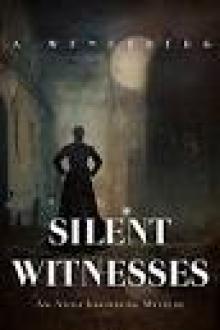 Silent Witnesses
Silent Witnesses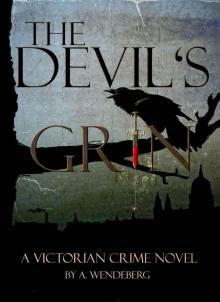 The Devil's Grin - A Crime Novel featuring Anna Kronberg and Sherlock Holmes (Kronberg Crimes)
The Devil's Grin - A Crime Novel featuring Anna Kronberg and Sherlock Holmes (Kronberg Crimes)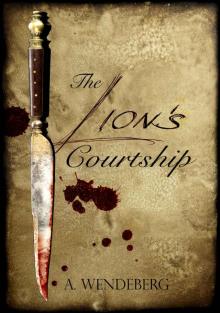 The Lion's Courtship: An Anna Kronberg Mystery
The Lion's Courtship: An Anna Kronberg Mystery 1/2986
1/2986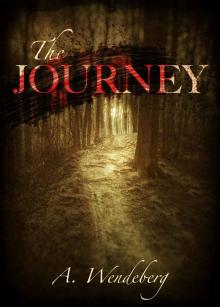 The Journey: Illustrated Edition (An Anna Kronberg Thriller)
The Journey: Illustrated Edition (An Anna Kronberg Thriller)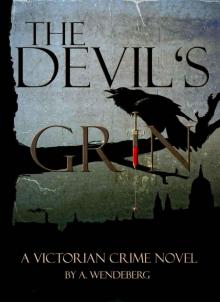 The Devil's Grin - a Crime Novel Featuring Anna Kronberg and Sherlock Holmes
The Devil's Grin - a Crime Novel Featuring Anna Kronberg and Sherlock Holmes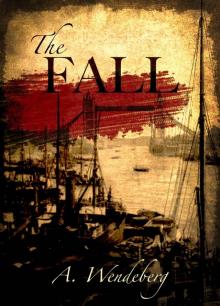 The Fall: Illustrated Edition (An Anna Kronberg Thriller Book 2)
The Fall: Illustrated Edition (An Anna Kronberg Thriller Book 2)